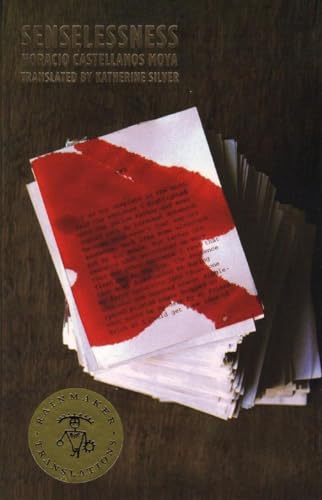Late Thursday night, after several PEN events and many drinks, a European friend and I succumbed to the temptation to make sweeping generalizations about the state of literature in America and abroad. Most of our aperçus wouldn’t withstand scrutiny in the sober light of morning, but I liked his epiphanic declaration that one of the worst things a piece of writing can be is “harmless.” By that standard alone, the work of the Austrian novelist and playwright Thomas Bernhard (1931 – 1989) is high art. As Horacio Castellanos Moya put it at “The Art of Failure,” an evening panel on Bernhard at the Austrian Cultural Forum, “Bernhard is a snake. He has rattles. He has poison.”
 Castellanos Moya knows whereof he speaks. He is the author of Revulsion: Thomas Bernhard in San Salvador, as well as the recently translated Senselessness, which adapts Bernhard’s long, rhythmic sentences into a Spanish-language idiom. The other “Art of Failure” panelists – scholar Fatima Naqvi, LIVE from the NYPL impresario Paul Holdengräber, and novelist Dale Peck, – had their own insights into Bernhard’s misanthropy. Naqvi has made a career out of studying it, Holdengräber is the scion of a Viennese family forced into exile during World War II, and Peck has raised hackles with his poison-pen reviews of fellow writers.
Castellanos Moya knows whereof he speaks. He is the author of Revulsion: Thomas Bernhard in San Salvador, as well as the recently translated Senselessness, which adapts Bernhard’s long, rhythmic sentences into a Spanish-language idiom. The other “Art of Failure” panelists – scholar Fatima Naqvi, LIVE from the NYPL impresario Paul Holdengräber, and novelist Dale Peck, – had their own insights into Bernhard’s misanthropy. Naqvi has made a career out of studying it, Holdengräber is the scion of a Viennese family forced into exile during World War II, and Peck has raised hackles with his poison-pen reviews of fellow writers.
It was odd, then, that “The Art of Failure” started off on a lethargic note. Moderator Jonathan Taylor, author of a recent Bernhard article in The Believer, was a soft-spoken, even phlegmatic host, and the panel’s format – in which each guest spoke for ten to fifteen minutes before conversation began – seemed ill-suited to its subject. Both Naqvi and Peck seemed to have over-rehearsed their opening remarks. And though Castellanos Moya – “This guy is writing because he doesn’t want to go out killing people!” – added some verve to the proceedings, Holdengräber concluded the first part of the discussion with an apt question: What would Bernhard think of us?
Not much, apparently. Bernhard, according to Naqvi, was a strident opponent of bourgeois cultural institutions like PEN World Voices and the Austrian Cultural Forum. He looked contemptuously on all forms of dilettantism and groupthink. Indeed, part of what Bernhard meant with his frequent invocation of the word “failure” and its synonyms was the condition of dilettantism. Like his countryman Wittgenstein, (whose nephew appears in one of Bernhard’s novels), he held himself to standards few writers are capable of observing.

 If the Bernhard panel failed to achieve rigor or purity, though, it did, in its second half, grow into something more involving. As monologues gave way to actual discussion, the panelists began to explore Holdengräber’s proposition that “there is something hygenic in [Bernhard’s] misanthropy.” Postwar Austrians, according to Naqvi, worked so hard to efface the strain of National Socialism in the culture that they often risked harmlessness. In novels such as The Loser and Correction, Bernhard made a place in postwar Austrian literature for a modernist aesthetics of opposition.
If the Bernhard panel failed to achieve rigor or purity, though, it did, in its second half, grow into something more involving. As monologues gave way to actual discussion, the panelists began to explore Holdengräber’s proposition that “there is something hygenic in [Bernhard’s] misanthropy.” Postwar Austrians, according to Naqvi, worked so hard to efface the strain of National Socialism in the culture that they often risked harmlessness. In novels such as The Loser and Correction, Bernhard made a place in postwar Austrian literature for a modernist aesthetics of opposition.
Dale Peck, whose critical writings I find both embarrassingly self-involved and hostile to the seductions of literature, proved to be surprisingly eloquent on Bernhard’s aesthetics. He spoke of the importance of “[giving] yourself over” to Bernhard’s totalizing sensibility and the anxiety it produces. And perhaps Bernhard didn’t always live as he wrote; Taylor offered evidence that Bernhard listened to Prince.
Ultimately, questions about the merits of Bernhard’s Weltanschauung remained unresolved. Those panelists who have flirted professionally with dilettantism seemed almost intimidated by Bernhard. And perhaps the novelist’s shade was hovering above us, watching in disgust. Still, in an age when literature too often flirts with harmlessness, the value of a room packed with Bernhard enthusiasts (and neophytes like myself) seemed beyond dispute.




